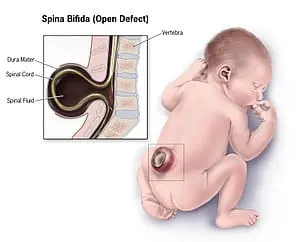The correct Folic acid dose during pregnancy along with overall nutritional support is essential for proper fetal development.
Folic acid is a water-soluble vitamin and is mainly found in leafy green vegetables and fruits.
It is important for pregnant women to have enough folic acid because it helps form the neural tube, which becomes the baby’s brain and spinal cord.
A pregnant woman needs 400 micrograms of folate (a form of folic acid) a day.
If she doesn’t get enough, her baby could be born with a birth defect called spina bifida.

What is the Folic Acid Dose During Pregnancy?
Though a pregnant woman is “eating for two”, it is not about eating more but rather eating the proper nutritional supplements to make available the necessary building blocks for fetal growth.
Prenatal vitamins are designed to supply many of these essential nutrients.
Proper nutrition contributes to normal embryologic development at all levels.
When it comes to dietary choices, it is also equally important to be sure that your prenatal diet does not lack nutrients that can contribute to the development of birth defects.
Folic Acid Dose During Pregnancy
Folic acid is a B vitamin (B9) and is required by the body (as are all vitamins) for normal growth and development.
- The optimal Folic acid dose during pregnancy is often discussed because of the association between folic acid deficiency and birth defects, most notably, spina bifida and other forms of neural tube defects.
- There have been some studies to suggest that folic acid may also help prevent heart defects and cleft lip and palate.
- The link between folic acid deficiency and fetal nervous system abnormalities was revolutionary. Though there is some question as to whether vitamin B12 is also involved in this association with birth defects.
- The incidence of spina bifida (a common form of neural tube defect) significantly decreased once folic acid supplementation became the standard of care for prenatal patients. In the United States alone, approximately 1,500 babies are born with spina bifida annually.
- Once the correct folic acid dose during pregnancy was determined and added to the prenatal care regimen the occurrence of spina bifida per 10,000 births decreased from 5 to 3.5 (.035% to .05%).
- After scientific research clearly demonstrated an association between the optimal folic acid dose during pregnancy and the incidence of neural tube defects, the correct folic acid dose during pregnancy became a standard in prenatal care.
- The March of Dimes became very active in disseminating this information to the “pregnant community” through various publications and educational channels.
- Gallop Polls were used to gather statistics and it became apparent that women ages 18-24 were least aware of the importance of folic acid during pregnancy and when it should be consumed to optimally benefit fetal neurologic development.
- March of Dimes then took this information to various industry groups to increase public awareness.
Spina Bifida

(Courtesy of Wikipedia)
Since pregnancy is often not planned (nearly 50%) and neural tube development occurs in the first month of fetal development, a push was made to educate the general public about the correct folic acid dose during pregnancy and the importance of starting it early in pregnancy if not prior to pregnancy for those planning pregnancy.
The recommended folic acid dose during pregnancy was 400mcg daily, though this has been increased to 600mcg and 800 mcg but no more than 1000mcg.
The dosage should be discussed with your prenatal care provider as there are many factors that can impact the amount to take, including Body Mass Index, multiple pregnancies, and various digestive disorders that might lead to a deficiency.
To impact both planned and unplanned pregnancies, the best approach is for women in their childbearing years to take a daily vitamin supplement with 400 mcg of folic acid.
This would make folic acid available during the early embryologic development of the neural tube.
The best advice is to take the correct folic acid dose during pregnancy, as soon as possible if you are pregnant or planning pregnancy.
Do not wait for your first prenatal visit to get a prescription for prenatal vitamins from your provider.
Typically, when calling the office for your first prenatal visit, prenatal vitamins will be ordered for you are told to start taking them at that time.
Furthermore, there are many prenatal vitamins available “over-the-counter” with the recommended folic acid requirements.
Because nearly half of all pregnancies in the United States are unplanned, women during their reproductive years should take what has been determined to be the correct folic acid dose during pregnancy, every day.
It has been suggested that if women took folic acid at least 400 mcg a day as a part of their daily diet intake, the occurrence of neural tube defects could be decreased by as much as 70%.
This is because folic acid would be available during early fetal development which is the most critical time to have the necessary supplements available for the development of the nervous system.
How can you get the correct folic acid dose during pregnancy?
In addition to supplements, you can also get folic acid from your diet. Folic acid is added to many foods and can be checked where ever the words “fortified” or “enriched” are stamped on a food item.
Some foods that are often enhanced with folic acid are: (this list is not all-inclusive)
- Cornmeal
- Flour
- Pasta
- Bread
- Breakfast cereal
- White rice
Fruits and vegetables are also good sources of folic acid:
- Broccoli
- Peanuts
- Citrus fruits
- Orange juice
- Beans
- Leafy green vegetables
- Asparagus
Do you need extra folic acid during pregnancy? Yes, if:
- You have had a prior pregnancy affected by a neural tube defect.
- You have diabetes.
- You are overweight. (Your body mass index (BMI) is 30 or higher. To find out your BMI, go to www.cdc.gov/bmi.
- You have a blood disorder such as Sickle Cell Anemia (discuss these disorders with your prenatal care provider.
- You take seizure medication.
Common Questions asked about folic acid dose during pregnancy:
1. When should a pregnant woman take folic acid?
Pregnant women should start taking folic acid as soon as they are aware they are pregnant.
Folic acid is an important supplement during fetal neurodevelopment which begins during the early stages of embryology.
2. How much folic acid should I take during pregnancy?
The latest recommended folic acid dose during pregnancy is 600mcg a day and up to as much as 800mcg but no more than 1000 mcg per day.
If you take a prenatal supplement, you will also be getting folic acid in the form of folate if you eat a balanced diet that includes green leafy vegetables.
3. What is a healthy source of vitamin B9?
Some healthy sources of folate you can add to your diet include Avocados, Brussels sprouts, asparagus, and leafy greens like spinach and lettuce.
What should a pregnant woman eat daily?
A pregnant woman needs to consume various nutrients every day to support her health and the development of her baby.
Protein is essential for building new tissue and can be found in meat, poultry, fish, legumes, and eggs.
Calcium is necessary for strong bones and teeth and is especially important during the third trimester when the baby’s skeleton is rapidly developing.
Pregnant women should aim to get 1000 mg of calcium per day from low-fat dairy products such as milk, yogurt, and cheese.
Iron is also important for the formation of new blood cells, and pregnant women need about 27 mg of iron per day.
Eating healthy during pregnancy:
Eating healthily during pregnancy is important for both you and your unborn baby.
Pregnant women need certain nutrients, including folic acid, iron, and calcium.
They also need to be careful about avoiding certain foods that could harm the baby, such as unpasteurized dairy products, raw meat and fish, and sugary drinks.
Making healthy food choices doesn’t have to be difficult or boring.
There are plenty of delicious and nutritious foods that are perfect for pregnancy.
- Fruits and vegetables are packed with essential vitamins and minerals, and they can be enjoyed fresh, frozen, or canned.
- Lean protein sources such as grilled chicken or fish, tofu, legumes, and eggs are also great choices.
- Be sure to include whole grains such as quinoa, brown rice, and whole wheat bread in your diet as well.
- And don’t forget to stay hydrated by drinking plenty of water throughout the day.



